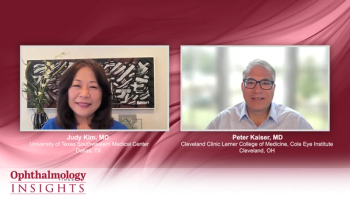
Experts discuss the use of steroids, particularly in the context of diabetic macular edema (DME). The inflammatory nature of DME reveals the effectiveness of steroids, especially in cases where persistent fluid remains despite anti-VEGF treatment.

Experts discuss the use of steroids, particularly in the context of diabetic macular edema (DME). The inflammatory nature of DME reveals the effectiveness of steroids, especially in cases where persistent fluid remains despite anti-VEGF treatment.

Experts discusses concerns related to the use of new agents, focusing on intraocular inflammation (IOI) and potential batch variations in biologics faricimab and aflibercept. He emphasizes close monitoring for IOI and advises clinicians to scrutinize patients for any signs of inflammation during follow-up visits.

Peter Kaiser, MD shares his early experiences with faricimab and high dose aflibercept for nAMD and DME. He notes positive outcomes, especially with hard-to-treat patients, and emphasizes the ongoing evaluation of patient response to treatment.

Peter Kaiser, MD discusses the utilization of newer agents, faricimab and high dose aflibercept, for refractory patients who haven't responded well to previous treatments and for patients doing well but aiming to extend dosing intervals.

Experts discuss the use of steroids, particularly in the context of diabetic macular edema (DME). The inflammatory nature of DME reveals the effectiveness of steroids, especially in cases where persistent fluid remains despite anti-VEGF treatment.

Experts discuss the approach to loading doses in the context nAMD and DME. Kaiser, MD explains that loading doses may not be necessary based on studies like the CAT study, while he highlights the importance of individualized treatment plans tailored to the specific needs of each patient and the nuances of different retinal diseases.

Judy Kim, MD and Peter Kaiser, MD discuss the significance of fluid dynamics in nAMD and DME, highlighting the detrimental effects of fluid fluctuations and emphasize the importance of minimizing these fluctuations to achieve better visual outcomes.

Judy Kim, MD and Peter Kaiser, MD reflect on the varying criteria for shortening or extending treatment intervals in clinical trials, emphasizing the need for standardization in large-scale studies. They highlight the importance of adapting trial criteria to clinical practice.

Experts discuss the efficacy and durability of newer therapies, focusing on faricimab and the high dose of aflibercept, highlighting the promising clinical trial results, maintaining comparable visual acuity efficacy while achieving longer durability.

Judy Kim, MD and Peter Kaiser, MD discuss the use of biosimilars and the potential introduction of biosimilar aflibercept for treating retinal diseases. Experts discuss their preferences for specific drugs and highlight the evolving landscape, anticipating challenges in drug selection and emphasizing the need for collaboration between retinal specialists and insurance companies to optimize patient care.

In this insightful discussion on changing therapeutic approaches in neovascular age-related macular degeneration (nAMD) and diabetic macular edema (DME), Judy Kim, MD and Peter Kaiser, MD address barriers like step therapy and the impact of insurance-guided choices on treatment outcomes. The conversation emphasizes the need for a personalized approach, citing clinical trial data while acknowledging the challenges of aligning real-world practices with stringent trial protocols.